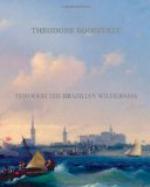Corumba is on a steep hillside, with wide, roughly paved streets, some of them lined with beautiful trees that bear scarlet flowers, and with well-built houses, most of them of one story, some of two or three stories. We were greeted with a reception by the municipal council, and were given a state dinner. The hotel, kept by an Italian, was as comfortable as possible—stone floors, high ceilings, big windows and doors, a cool, open courtyard, and a shower-bath. Of course Corumba is still a frontier town. The vehicles ox-carts and mule-carts; there are no carriages; and oxen as well as mules are used for riding. The water comes from a big central well; around it the water-carts gather, and their contents are then peddled around at the different houses. The families showed the mixture of races characteristic of Brazil; one mother, after the children had been photographed in their ordinary costume, begged that we return and take them in their Sunday clothes, which was accordingly done. In a year the railway from Rio will reach Corumba; and then this city, and the country roundabout, will see much development.
At this point we rejoined the rest of the party, and very glad we were to see them. Cherrie and Miller had already collected some eight hundred specimens of mammals and birds.
III. A jaguar-hunt on the Taquary
The morning after our arrival at Corumba I asked Colonel Rondon to inspect our outfit; for his experience of what is necessary in tropical travelling has been gained through a quarter of a century of arduous exploration in the wilderness. It was Fiala who had assembled our food-tents, cooking-utensils, and supplies of all kinds, and he and Sigg, during their stay in Corumba, had been putting everything in shape for our start. Colonel Rondon at the end of his inspection said he had nothing whatever to suggest; that it was extraordinary that Fiala, without personal knowledge of the tropics, could have gathered the things most necessary, with the minimum of bulk and maximum of usefulness.
Miller had made a special study of the piranhas, which swarmed at one of the camps he and Cherrie had made in the Chaco. So numerous were they that the members of the party had to be exceedingly careful in dipping up water. Miller did not find that they were cannibals toward their own kind; they were “cannibals” only in the sense of eating the flesh of men. When dead piranhas, and even when mortally injured piranhas, with the blood flowing, were thrown among the ravenous living, they were left unmolested. Moreover, it was Miller’s experience, the direct contrary of which we had been told, that splashing and a commotion in the water attracted the piranhas, whereas they rarely attacked anything that was motionless unless it was bloody. Dead birds and mammals, thrown whole and unskinned into the water were permitted to float off unmolested, whereas the skinned carcass of a good-sized monkey was at once




